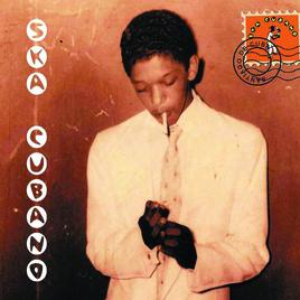www.skacubano.com
Babalu
Ska Cubano Lyrics
Jump to: Overall Meaning ↴ Line by Line Meaning ↴
Ya esta empezando los velorios
ke le hacemos a Babalú,
traime 17 velas,
pa ponerla en kruz.
Y taríme un cabo de tabako Maayeye,
y traime un poko de dinero Mayeye,
pa ke nos de la suerte.
Yo kiero pedir,
ke mi negra me kiera,
ke tenga dinero,
pe ke no se muera.
Y yo le kiero pedir a Babalú,
una negra, una nena komo tu,
ke no tenga otro negro,
pa ke no se fuera.
Negro!
Babalú, Babalú!
Ke le hacemo a Babalú,
kuando venga después!
Chango Babalú!
Ke riko Babalú!
The song Babalú by Ska Cubano is rooted in the Afro-Cuban religion Santería. In the religion, Babalú Ayé is a deity who is associated with sickness, healing, and the earth. The first lines of the song translate to "The wakes we do for Babalú are starting. Bring me 17 candles to put them in a cross." This references the practice of placing candles in a specific formation during a religious ceremony.
The lyrics proceed to call for offerings to Babalú, including tobacco and alcohol, which are common offerings in Santería. The singer asks for some money to be blessed by Babalú for good luck. The following verses express personal desires, including wanting a loved one to reciprocate their affection, wanting financial stability, and wanting a romantic partner who will not leave. The repeated use of the word "negra" (meaning 'black woman') is significant because it relates to the African diaspora and the importance of black women in Afro-Cuban culture.
The song's chorus continues to chant Babalú's name with enthusiasm and excitement. The final lines include the phrase "Chango Babalú," which references another Santería deity named Chango who is associated with thunder and lightning. The combination of the two names is a common expression in Afro-Cuban religion, indicating unity and power.
Overall, Babalú celebrates the rituals and beliefs of Santería, sharing its spirituality and music with a wider audience.
Line by Line Meaning
Babalú, Babalú!
The people are calling out to the spirit Babalú who they wish to honor with a ceremony.
Ya esta empezando los velorios
The funerary wake is beginning, as the mourners prepare to honor Babalú.
ke le hacemos a Babalú,
The mourners are asking what they should do to honor Babalú.
traime 17 velas,
They request 17 candles to light during the ceremony.
pa ponerla en kruz.
They intend to arrange the 17 candles in a cross shape.
Y taríme un cabo de tabako Maayeye,
They also request tobacco to offer to Babalú as a gift.
y un jarrito de aguardiente,
They would also like some alcohol to offer as another gift for Babalú.
y traime un poko de dinero Mayeye,
The mourners request a bit of money to bring them luck during the ceremony.
pa ke nos de la suerte.
They hope that the money will bring them good fortune during the ceremony and beyond.
Yo kiero pedir,
One of the mourners wishes to make a request of Babalú.
ke mi negra me kiera,
They ask that their loved one cares for them deeply and returns their affection.
ke tenga dinero,
They also request wealth or financial stability in their life.
pe ke no se muera.
Lastly, they hope that Babalú will spare them from experiencing the pain of losing their loved one.
Y yo le kiero pedir a Babalú,
Another mourner has their own request for Babalú.
una negra, una nena komo tu,
They hope to find a partner like Babalú, who is strong and respected.
ke no tenga otro negro,
They want their partner to only have eyes for them, and not be seeing anyone else.
pa ke no se fuera.
They hope that their partner remains faithful and stays with them for the long term.
Negro!
The mourners shout out in praise of Babalú, acknowledging their reverence for the spirit.
Ke le hacemo a Babalú,
The mourners ask what they should do when Babalú comes again in the future.
kuando venga después!
They anticipate Babalú's return and plan to continue honoring and showing respect to the spirit.
Chango Babalú!
The mourners offer up another name for Babalú in recognition of the spirit's many names and forms.
Ke riko Babalú!
They express their awe and admiration for Babalú as they consider the many ways in which the spirit has impacted their lives.
Contributed by Caroline M. Suggest a correction in the comments below.
